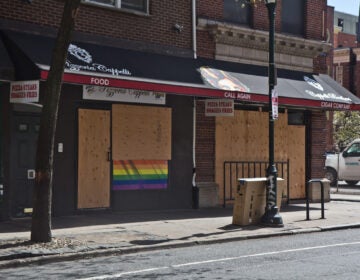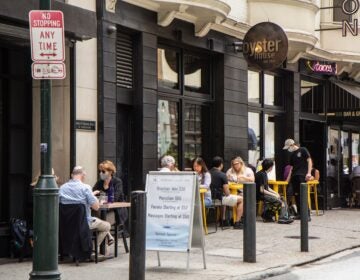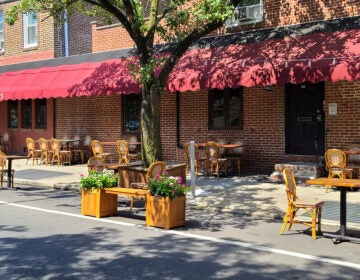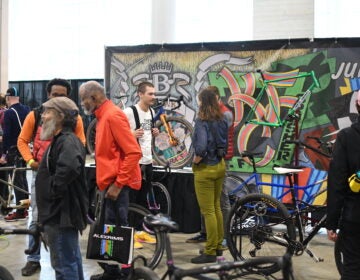COVID forced a reckoning in Philly’s restaurant scene
The pandemic has exposed inequities in Philly's restaurant industry. Workers are speaking out and some restaurants are making changes. Here's what it could it mean for diners.
Listen 15:57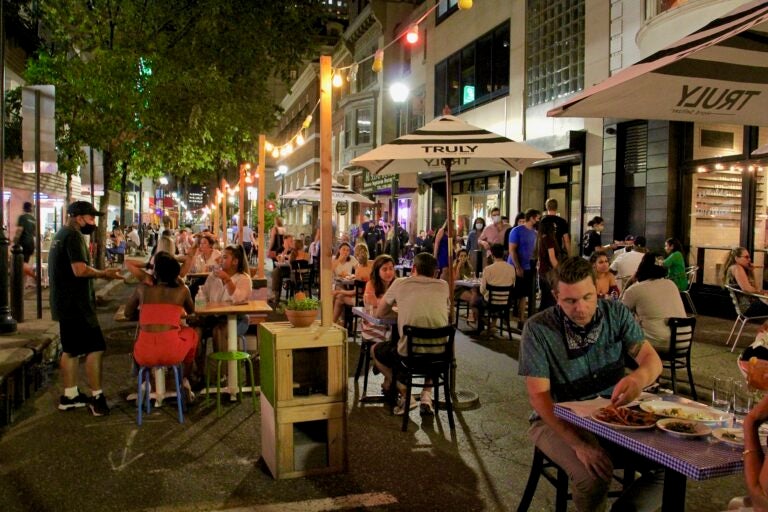
A block of Sansom Street in Center City is closed to traffic for outdoor dining. (Emma Lee/WHYY)
The pandemic and the George Floyd protests that followed brought to a boil long-simmering issues of inequity in the Philadelphia restaurant industry. Now, as COVID-19 has cut into restaurants’ razor-thin profit margins, workers are demanding change.
Alex Tewfik, food editor for Philadelphia Magazine, who also worked in the industry for a decade, explains how some restaurants are now rethinking their business models and culture — and what it could mean for diners.

Hear the whole story on The Why
Interview highlights
On what he observed working in the restaurant industry
I saw an immense amount of sexual harassment, racism, just general abuse — from verbal abuse to exploitation, expecting people to go above and beyond without paying them what it takes to go above and beyond … It’s full of every “ism” you can imagine. But on top of that … it’s also like a really fun work environment. I mean, every restaurant is a team and it’s, I would even say it’s similar to sports … You have this one vision as a team to get like the night over and you work together. It was always like people from all backgrounds, … different countries, different socioeconomic status, different neighborhoods in Philly … So there was like there was always this sort of tension between having fun that would be propped up against all sorts of abuse and sexual harassment and racism and all sorts of things like that.
On how the restaurant industry is built on pay inequities
The restaurant industry was sort of built on this model that its front-of-the-house servers — which is made up of at least 50% of the staff usually — those people would be paid by the customers of the business in tips … So therefore, the owners who make very little money don’t have to pay 50% of their staff. They sort of push that onto the customer. So then owners, all they had to do was pay for their back-of-the-house employees, basically.
When you enter the back of the house, things get really weird. So you get dishwashers making minimum wage; cooks who are making an hourly wage, who are traditionally expected to work longer hours than they’re making money for; and then there are undocumented workers, which make up a huge part of the restaurant industry, who are making sometimes less than minimum wage under the table in cash. So you’re seeing this huge discrepancy between the front and back of the house, which many times leads to a lot of tension in restaurants, which many times leads to a lot of abuse in restaurants.
On how the pandemic propelled workers to speak out
The system was you work your ass off in the back of the house and you move up or you go on to open your own business, which was like a really amazing sort of story to tell ourselves. But once the pandemic came and ripped everything to shreds, everyone was stuck at home and they started looking at the industry for the first time. And they’re like, “Wait, this isn’t right. Why are we stuck at home right now? Why don’t I have health care in a pandemic?” And that in itself propelled industry workers in the city to organize themselves.
On why change could come with higher meal prices
I do not think it should be only on the restaurant owners. I think that dining culture has to change, too. I think we need to start expecting to pay, you know, 50 bucks for entrees and twenty five bucks for apps instead of what it is now, which is like fifteen bucks for apps and like twenty five bucks for entrees. I think we need to really expect to pay a lot more to dine out, which makes going out to eat more of a theater [experience] and a more of a big deal, which I think goes against what we’ve built in the last two decades, which is casual once-a-week kind of restaurants. Those are gonna be at odds with the kind of with the prices that are necessary to to make a restaurant a fair and equitable business.
WHYY is your source for fact-based, in-depth journalism and information. As a nonprofit organization, we rely on financial support from readers like you. Please give today.



